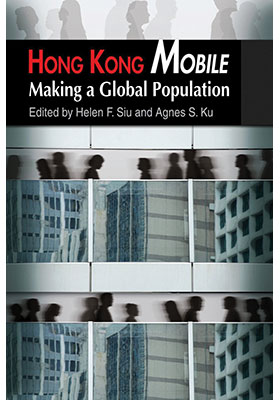Hong Kong Mobile
Making a Global Population
(香港移動: 創造一個全球性人口)
ISBN : 978-962-209-918-0
February 2009
508 pages, 6″ x 9″
- HK$295.00
Ebooks
Also Available on
In this interdisciplinary study, the authors argue that Hong Kong must develop and strengthen the mobility, broadly defined, of its population. This is at the heart of its need to face the challenges from a changing global environment. Being a “space of flow” and a place of mobility has always been an essential characteristic of Hong Kong and the root source of its success. This uniqueness, it is argued, must go hand in hand with enhancing its institutional resources that its regional competitors have yet to develop.
It uses historical data to argue that “One country, Two systems” is a concept not uniquely reserved for post-1997 Hong Kong. The territory has thrived on being simultaneously part of China and the world. It has been a node in the crossroads of empires, trading communities, industrial assembly lines, and now global finance, consumption and media.
The book, using meticulous analysis of census data, shows that a porous border in fact has been maintained through the post-war years, with waves of immigrants entering from China. However, the study warns that the population is now ageing when compared with other world cities and China’s fast-growing urban centers. Without massive input of young, educated, and diverse human talents, Hong Kong will lose its strategic positioning in the region. Only with such inflow can Hong Kong remain, as it historically has been, a vibrant space of flow of capital, goods, people, information, services, global cultural horizons, creative aspirations and civic energies.
Hong Kong has met its past challenges through an institutional structure that is conducive to legal and business integrity, educational openness, high professional standards and cultural diversity. With mobility encouraged and institutional resources enhanced, those who exit and enter the territory during different phases of their education, lives, and careers will deposit value to local society and connect it to regional and global environments, making it a hub of hubs.
“In the 1970s–80s, Hong Kong, the great open place, had a special moment, educating mainlanders, just opening, how to be like Hong Kong. They succeeded. For Hong Kong, no longer unique, what next? Able social scientists explore, with perspective.” —Ezra F Vogel, Henry Ford II Professor of Social Sciences Emeritus, Harvard University
“The insightful contributors are themselves a microcosm of the wonderful human tapestry that makes Hong Kong tick. Imagine the Global City as a Mobius Ring in space-time. Staying ahead means being transcendent and diverse. This book is essential reading for Hong Kong bulls and bears.” —Raymond Ch’ien, GBS, CBE, JP; Member, Executive Council of Hong Kong 1992–2002; Chairman of MTR Corporation Limited, Hang Seng Bank Limited and CDC Corporation
“Who is a Hong Konger? What makes a Hong Konger? These questions are particularly pertinent in the 21st century as Hong Kongers try to redefine themselves and their roles in an economically powerful motherland. This volume explores these questions and crosses border in multiple ways. It is a competent interdisciplinary and inter-institutional effort. A fine example of bridging academic research and policy thinking.” —Laura M. Cha SBS, JP; Member, Executive Council of Hong Kong; Deputy Chairman, HSBC Asia Pacific
“What transformed Hong Kong from a 19th-century village into the most dynamic international city in Asia of today? Who made this possible? How is the city now? In this collection, Professors Siu and Ku offer both a rare opportunity for us to look for answers and a window into the future of our globalized world.” —Zhiwu Chen, Professor of Finance, Yale University
“Hong Kong Mobile: Making a Global Population . . . should be made compulsory reading for all senior officials and members of government advisory bodies . . . . It is about the crucial importance of geographic and social mobility, and the need for constant renewal if Hong Kong is to retain its global outlook and dynamism at a time when its population is ageing and when forces protecting the status quo may be growing more powerful. Hong Kong is an anomalous place that can only thrive by doing things that are to the advantage of its neighbours, be they the mainland, East Asia or the world of commerce and finance. And it can only do those if it is open to the talent and ideas of individuals; local, mainland and foreign.” —Philip Bowring, South China Morning Post



